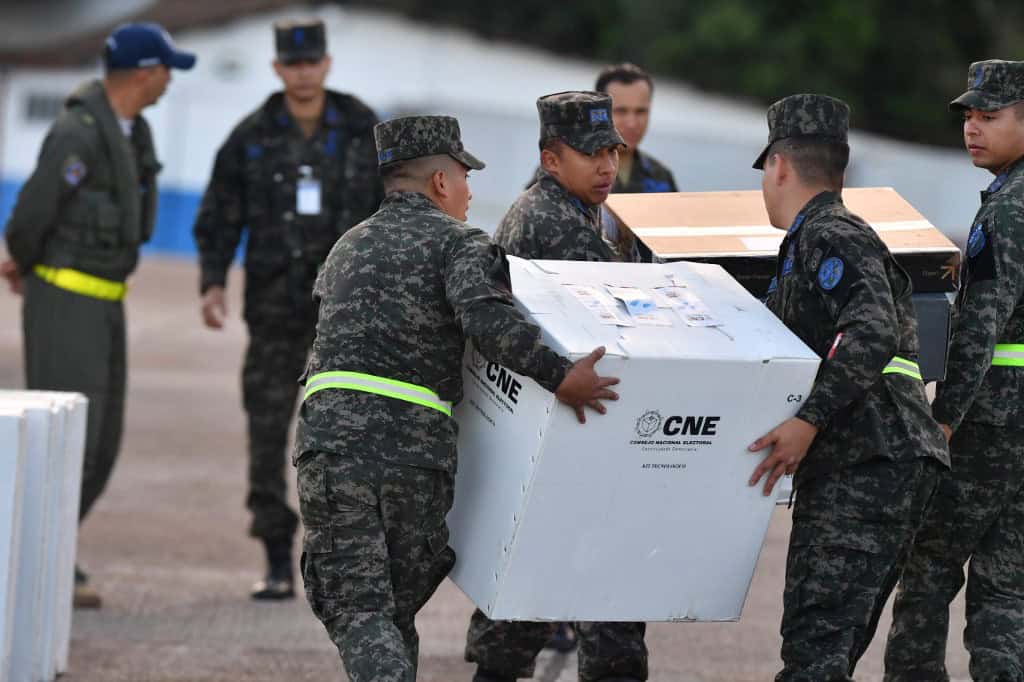A president sent out of the country in his pajamas, another locked up in a U.S. prison for drug trafficking, deep turquoise waters that gave the country its name. Here are five key points about Honduras ahead of Sunday’s general elections.
Coup in pajamas
In the early hours of June 28, 2009, soldiers backed by business leaders and right-wing politicians yanked President Manuel Zelaya out of bed at gunpoint. Zelaya, an ally of Hugo Chávez’s Venezuela and accused of seeking to cling to power, was put on a plane in his sleepwear and flown to Costa Rica.
The coup deeply split Hondurans. After 12 years under right-wing presidents, voters brought Zelaya back to the forefront by electing his wife Xiomara Castro in the 2021 elections as Honduras’ first female president.
Hondurans are now torn between continuing with the left, represented by Liberty and Refoundation (Libre), the party founded by Zelaya, or returning to the right with the traditional National Party (PN) and Liberal Party (PL).
The “narco-state”
In April 2022, barely three months after leaving office, Juan Orlando Hernández — who had governed two terms since 2013 after disputed elections — was extradited on a DEA plane. Accused by U.S. prosecutors of turning Honduras into a “narco-state” and a major drug highway, he was sentenced in 2024 to 45 years in prison.
His case symbolizes the penetration of drug trafficking in Honduras, where politicians from all parties have been tainted, including the Castro government. A year ago, a video leaked showing Zelaya’s brother negotiating money from local cartel bosses for the 2013 campaign.
Land of gangs
Honduras, one of the most violent countries in Latin America, suffers — like Guatemala — under the terror of the Barrio 18 and Mara Salvatrucha gangs. Since December 2022, Castro’s government has maintained a state of exception similar to the one President Nayib Bukele imposed to bring homicides in El Salvador down to historic lows. Both strategies are criticized by human rights advocates.
Although homicides in Honduras dropped from 38.1 per 100,000 inhabitants in 2022 to 26.8 in 2024, according to official data, gang members continue to extort transport workers and shopkeepers, and the state of exception has led to torture and abuses of power, according to the human rights NGO Cristosal.
Archaeological and natural treasures
Described by archaeologists as the “Mayan Athens,” the Copán ruins, a UNESCO World Heritage Site, are Honduras’ main Mayan remains. Their stairways, stelae and temple structures attract tourists, who, however, mostly end up falling for the paradise-like Caribbean islands of Roatán, with their turquoise waters. In the mountains and along the coasts live the Maya Ch’ortí, Tolupan, Garífuna, Miskito and other ethnic groups.
Honduras — named, according to legend, for the deep waters encountered by the first Spanish sailors — has along its Caribbean coast part of the world’s second-largest barrier reef, after Australia’s.
Poverty and migration
Poverty, which affects 60% of Honduras’ 11 million inhabitants, and criminal violence have pushed tens of thousands to migrate to the United States every year. Family remittances account for 27% of Honduras’ Gross Domestic Product (GDP). In 2024, they exceeded 10 billion dollars, but experts predict that figure will fall.
Migration has ceased to be an option for many Hondurans with Donald Trump’s return to the White House and his migrant crackdown. So far this year, nearly 27,000 Hondurans have been deported, 10,000 more than in 2024, in a forced return that shows no sign of ending.






